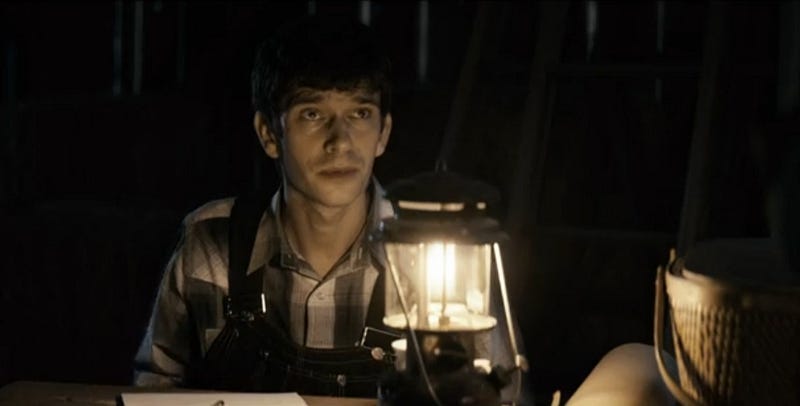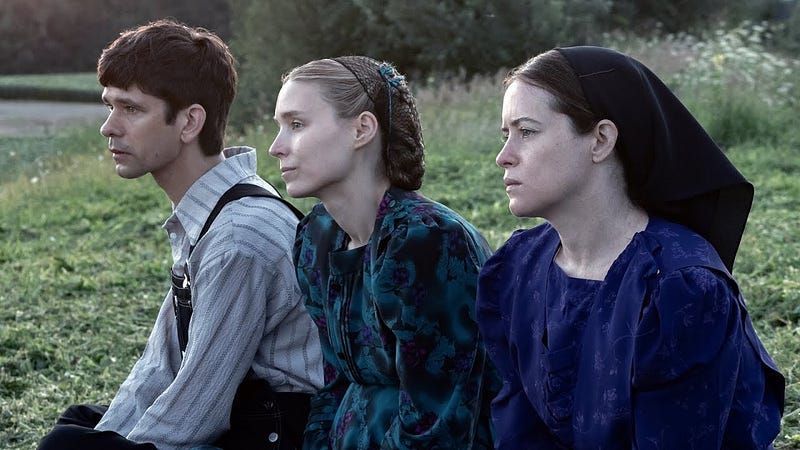Why ‘Women Talking’ was the best film of 2022
Disclaimer: This article is written based on the opinion of the author and does not in any way reflect the view of the organisation.
Disclaimer: This article is written based on the opinion of the author and does not in any way reflect the view of the organisation.
If anything good ever came from 2022, it would be the lineup of films that showcased phenomenal performances, brilliant storylines and skilled direction. As the 2023 Oscars came around, the film “Everything Everywhere All at Once” made history in several categories, the most notable being Michelle Yeoh as the first woman of Chinese ethnicity to win Best Actress, and the first Malaysian to win any Academy Award. While I would agree that the sci-fi action comedy showed innovative storytelling, impressive visuals, and strong performances, I feel as though the spotlight could have been shone just as bright on another dark horse of the oscars.
“Women Talking” is a film that addresses a complex and difficult issue with sensitivity, nuance, and emotional depth. The film is directed by Sarah Polley and based on the novel by Miriam Toews. It tells the story of a group of women in a Mennonite community who gather together to discuss how to respond to the sexual assault they have experienced at the hands of men in their community.
The film women talking is notable for its “visual medium,” which is a format that gets heavily scrutinised because films that are dialogue forward are often deemed “uncinematic,” or “too much like a play.” As always, there are so many exceptions to a so-called “rule” when the characters talking to each other can be “cinematic,” if the dialogue is good and the acting holds your interest, or is even relatable to your life. Ethan Hawke and Julie Delpy talking for the entirety of the “Before” trilogy is plenty cinematic. Sarah Polley’s trust in the material and her actors allows for the performances to flourish, and the performances drive the story along with the barrage of words.
The Opening
The film opens with a prologue that sets the stage for the film’s main narrative. The prologue features voice-over narration by the character Autje, the sixteen-year-old daughter of Mariche. Autje opens with describing a series of brutal ‘attacks’ that have occurred in the mennonite community. She explains how the attacks have been carried out by a group of men in the community, who are using a sedative to render the women unconscious before assaulting them. Although many women of the colony have come forward regarding the attacks, many elders of the colony claim that it was the doings of a ghost, satan, or even a work of female imagination.
Due to the continuous pattern of attacks, the women of the colony decided to take a vote on the future of their lives in the colony. They created a voting system for all the women to determine which of the three options they preferred: to stay and do nothing, stay and fight or leave everything behind. After collecting the votes from every woman in the colony, it was revealed that there was a three way tie. This led Ona, Salome, and Mariche to lead a group of discussions to determine what their next course of action is. They consider the possibility that they must leave the colony entirely, as they cannot risk the safety of the younger girls. The mennonite community school teacher, August Epp, who is a close friend to Ona, is brought in to record the minutes of their meetings, and occasionally intervenes in their discussions, but ultimately knows that the decision is not his.
One of the interesting decisions that Polley makes in her adaptation is keeping the timeline relatively unclear; while the film is set in 2010, there is no mention of recent events, modern technology, or geography. While this can be explained by the community’s strict adherence to traditionalism, it also shows the timeless nature of the story. A brief use of The Monkees’ classic song “Daydream Believer” is the only indication of a specific time or place.
The Fear of being Ostracised
One of the reasons why I would consider “Women Talking” to be a contemporary masterpiece, is that the film raises important questions about the rights of women in religious communities, particularly in conservative communities where patriarchal power structures are deeply entrenched. As many of the women start to realise the pattern of abuse against them, it prompted secret meetings held by the women of the Mennonite community to discuss how to respond to the attacks and to make decisions about their own futures.
The meetings take place in a barn, away from the eyes and ears of the community’s men and elders, who have traditionally held all of the power and made decisions on behalf of the community. The women are initially hesitant and fearful, knowing that they risk punishment and ostracism if they are discovered.
In the secret meetings in “Women Talking”, the group of women discuss a range of issues related to the sexual assaults that have occurred in their community. Ona (Rooney Mara), Salome (Claire Foy) and Mariche (Jessie Buckley) resonate on screen as individuals but they also represent certain recognisable archetypes. Ona, who was impregnated by one of the attackers, appears almost serenely philosophical. She isn’t afraid of raising moral and practical questions around the vote. If you stay, how do you raise your sons so this never happens again? Do you bring any men with you? Do you fight for your family or abandon it? Is forgiveness permission? Has it been? Salome however, is filled with fury and murderous rage after discovering that her small daughter has been infected with a sexually transmitted disease by one of the attackers; and Mariche is an obedient wife who believes the women should stay silent of the attacks in fear of being othered or prevented from entering the gates of heaven. Each woman embodies one possible response to the men’s crimes against them.
Some of the topics discussed in the meetings include the meaning of forgiveness. The women grapple with the concept of forgiveness, and whether it is possible or desirable to forgive their attackers. Women like Ona, believe that forgiveness is necessary for healing and moving forward, while others like Salome feel that forgiveness would be a betrayal of their right to safety and bodily autonomy. Additionally, Mariche expresses that there may be hope for the men to change as many of them were conditioned to believe that they are entitled to control and dominate women.
Men are Victims to the Patriarchy

As seen throughout the movie, the women describe how the men in their community have been taught to view women as inferior, submissive, and subservient to men. This conditioning is perpetuated through various means, including religious teachings, cultural traditions, and gendered expectations. The young men are depicted as being complicit in the violence and abuse that has been perpetrated against the women in their community. They are shown participating in the assaults, remaining silent in the face of violence, and failing to hold their peers accountable for their actions.
At the same time, however, the movie also suggests that there may be hope for the younger generation to break free from this cycle of violence and abuse. August Epp is a perfect example of a man who was able to break free from the confines of toxic masculinity. After being excommunicated by his community, August completed his education in university and travelled aimlessly before becoming a school teacher. It was from his years of travelling and pursuing education he realised the harmful themes that the mennonite community had subjected the young men into believing.
One of the characters, Mariche is shown to have complex and nuanced relationships with the men in her community, including her father and her former fiancé. She recognizes that the men in the community are also subject to societal and cultural pressures that reinforce harmful gender norms and perpetuate violence. She acknowledges that many men are also victims of the patriarchal system that has created an environment in which violence against women is normalised.
The Importance of Education
Education is a crucial theme in “Women Talking” and is presented as a powerful tool for women to empower themselves and break free from the cycle of violence and abuse in their community. Throughout the movie, the women discuss how their lack of education has contributed to their vulnerability and their inability to speak up and advocate for themselves. With many of the women being illiterate, the movie depicts how the women’s lack of education has been perpetuated by societal norms and patriarchal structures that view women as inferior and unworthy of formal education. The women describe how they have been denied access to education, either because of financial constraints, cultural traditions, or social expectations.
In the film, Ona, a pregnant woman who maintains a level head throughout the discourse, lays down the visions she has for the world she wants her child to grow up in. In this world, girls have a place in schools where they’re educated; women have access to a world map so that they know where they are, and the teachings are laced with love and not strict rules. Although Mariche, a victim of severe abuse from her husband Klaas, readily shoots down Ona’s visions as dystopian dreams. It’s interesting that Mariche creates the loudest ruckus and violently attacks every other woman, from Ona to Salome, for their opinions, but the fact that she has been offered a choice to decide her fate eludes her. This is why feminism is needed in a world where women are shackled to the fetters of sexism and patriarchy, to liberate women from households where the drunken husband unleashes violent wrath on the daughter and the wife. The film closes on a brighter note, where the rows of carriages leave with the hope of better days.
Despite these challenges, the women in the movie are determined to educate themselves and empower themselves through knowledge. They form study groups and engage in lively debates, sharing ideas and perspectives that challenge their previous assumptions and beliefs. Through this process, they discover a sense of agency and self-worth that had previously been denied to them.
Overall, “Women Talking” is a highly acclaimed film that has been praised for its powerful storytelling, insightful exploration of complex issues, and authentic performances, and is considered by many, (including myself) to be a masterpiece of contemporary cinema.
[Written by: Harshaall Naidu. Edited by: Teoh Jin]





